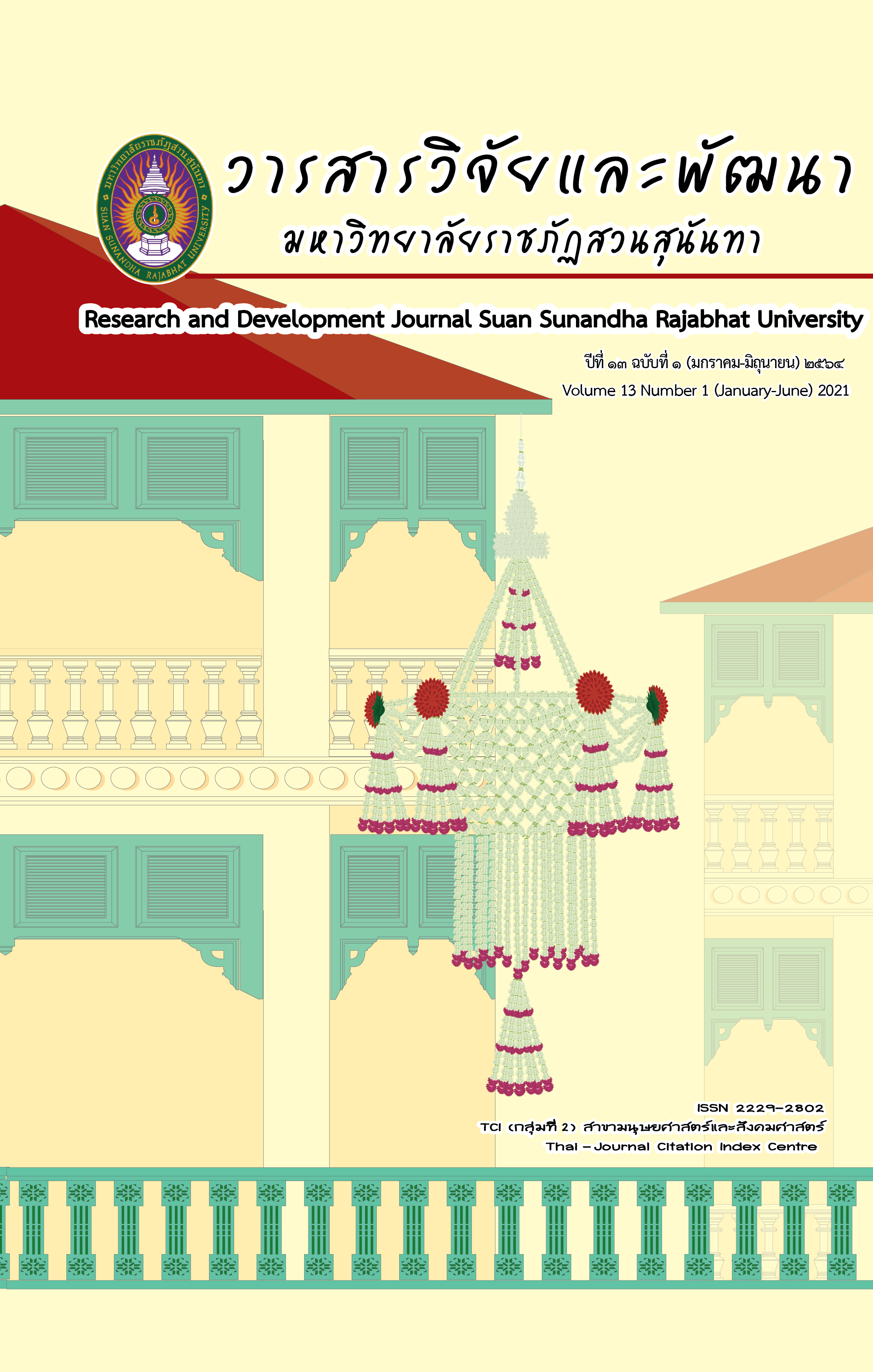แนวทางการพัฒนาส่วนประสมทางการตลาดที่ส่งผลต่อความจงรักภักดี ในตราสินค้าของนักท่องเที่ยว อำเภอบ่อเกลือ จังหวัดน่าน
คำสำคัญ:
ส่วนประสมทางการตลาด, ความจงรักภักดีในตราสินค้า, นักท่องเที่ยว, อำเภอบ่อเกลือ, จังหวัดน่านบทคัดย่อ
การวิจัยนี้ศึกษาความสัมพันธ์ระหว่างปัจจัยส่วนประสมทางการตลาดและความจงรักภักดีต่อตราสินค้าของนักท่องเที่ยว และปัจจัยส่วนประสมทางการตลาดที่มีอิทธิพลต่อความจงรักภักดีต่อตราสินค้าของนักท่องเที่ยว ใช้รูปแบบของวิธีวิจัยเชิงปริมาณ กลุ่มตัวอย่าง คือ นักท่องเที่ยวที่เคยมาท่องเที่ยว ณ อำเภอบ่อเกลือ จังหวัดน่าน ระหว่างปี พ.ศ. 2558 – 2563 จำนวน 300 ตัวอย่าง เครื่องมือที่ใช้ คือ แบบสอบถาม พบว่า ส่วนใหญ่เป็นนักท่องเที่ยวเพศหญิง อายุระหว่าง 23 – 40 ปี อาชีพพนักงานบริษัทเอกชน สถานภาพโสด และรายได้เฉลี่ยต่อเดือน 15,001 – 30,000 บาท ระดับความคิดเห็นเกี่ยวกับส่วนประสมทางการตลาดและความจงรักภักดีต่อตราสินค้าโดยรวมอยู่ในระดับมาก จากการวิเคราะห์สัมประสิทธิ์สหสัมพันธ์ พบว่า การบอกต่อเชิงบวก สามารถพยากรณ์ส่วนประสมทางการตลาดได้ด้วย 2 ปัจจัย ได้แก่ บุคลากร และลักษณะทางกายภาพ ตามลำดับ การกลับมาท่องเที่ยวซ้ำสามารถพยากรณ์ 2 ปัจจัย ได้แก่ บุคลากร และลักษณะทางกายภาพ การมีส่วนร่วมในการปกป้องสามารถพยากรณ์ 3 ปัจจัย ได้แก่ การส่งเสริมการตลาด กระบวนการ และบุคลากร ตามลำดับ ความเชื่อมั่นสามารถพยากรณ์ 3 ปัจจัย ได้แก่ กระบวนการ การส่งเสริมการตลาด และบุคลากร ตามลำดับ และความพึงพอใจสามารถพยากรณ์ 2 ปัจจัย ได้แก่ การส่งเสริมการตลาด และกระบวนการ ตามลำดับ
เอกสารอ้างอิง
Aaker, D. A. (1991). Managing brand equity: Capitalizing on the value of a brand name. New York: Free Press.
Cohen, J. (1988). Statistical power analysis for the behavioral sciences. Hillsdale, NJ: Lawrence Erlbaum Associate.
Department of Tourism. (2019). Dusit Thani freehold and leasehold real estate investment trust (DREIT). Retrieved June 10, 2020, from https://market.sec.or.th/public/ipos/IPOSGetFile.aspx?TransID=251523&TransFileSeq=44.
Jakkapat Kittinorrarat. (2015). Customer loyalty to mobile phone service companies among students in higher education institutions in Bangkok. Journal of Economics and Management Strategy, 2(1), 25-42.
Kotler, P., & Keller, K. L. (2012). Marketing Management. (2012). Marketing management. (14th ed.). Upper Saddle River, NJ: Pearson Education.
Lazarevic, V., & Petrovic-Lazarevic, S. (2008). Increasing brand loyalty of generation Y for the future marketers. In Proceedings of the 3rd Biennial Conference of the Academy of World Business, Marketing and Management Development: Managing and Marketing Organizations in an Era of Global Complexity (pp. 731-740). Perth WA, Australia: Academy of World Business, Marketing and Management Development.
Leimstoll, U., Corbitt, B., & Peszynki, K. (2008). Impacts of logistics service performance through it on overall tourist satisfaction and loyalty. In European Conference on Information System (ECIS) 2008 Proceedings (pp. 1-13). Galway, Ireland: ECIS.
Liang, N. H., Corbitt, B. J., & Peszynski, K. J. (2007). Impact of logistics service Performance though it on Overall Tourist Satiafaction and Loyalty. Melbourne: Royal Melbourne Institute of Technology University.
Lim, H., Widdows, R., & Park, J. (2006). M‐loyalty: winning strategies for mobile carriers. Journal of Consumer Marketing, 23(4), 208-218.
Ministry of Tourism and Sports. (2018). Situation of Thai tourists. Retrieved June 15, 2020, from https://market.sec.or.th/public/ipos/IPOSGetFile.aspx?TransID=251523&TransFileSeq=44
Ministry of Tourism and Sports. (2019). The second Thailand national tourism development plan (2017 - 2021). Retrieved June 10, 2020, from https://www.mots.go.th/more_news_new.php?cid=66.
Napaporn Janchai, Rungroj Yenchaipruk, Suchada Aphirat and Pimnet Marksap. (2017). Influential factors on tourist loyalty for floating market (Research report). Bangkok: Suan Dusit University.
Phiangjai Benjaputtarak. (2009). Factors affecting customers’ choice of multi-purpose loan of the Krungthai bank public company limited in Mueang District,Chiang Mai Province (Master’s thesis). Chiang Mai University. Chiang Mai.
Sasitorn Kathananon, Aussanee Sakyai. (2009). Study of Personal Qualities and Market Factors Affecting Behavior and confidence level of users of private hospital weight loss centers in Bangkok. Master of Business Administration. Naresuan University.
Schiffman, L. G.; & Kanuk, L. L. (2007). Consumer behavior. (9th ed). Upper Saddle River, NJ: Prentice-Hall.
Sedtawat Prommasit. (2016). Approaches to development of tourism logistic system in Bangkok metropolis. Journal of Southern Technology, 9(1), 37-43.
Siriwan Sereerat, Parin Laksitanon, and Suporn Sereerat. (1998). Marketing management. Bangkok: Thammasarn.
Statistical Office Nan Province. (2019). Tourism situation in Nan. Retrieved June 7, 2020, from http://nan.nso.go.th/index.php?option=com_content&view=category&id=111&Itemid=510
Tateetorn Teerakwanroj. (2013). Service marketing. (14th ed.). Bangkok: S. Asia Press.
Thanaporn Mahattanyawanich, Jedsada Wongsansukcharoen and Somboon Sarapad. (2018). Service marketing mix and customers’ percived value influence tocuatomer loyalty of healthy food restaurant Chon Buri Province. Journal of Administration and Management, 8(1), 69-82.
The World Economic Forum. (2019). Travel & tourism competitiveness report 2019. Retrieved June 7, 2020, from https://www.weforum.org/.
Usanakorn Supanpaeshast. (2012). Factors Affecting Tourists’ Satisfaction and Loyalty Toward The 119 year-old Chetsamian Market, Ratchaburi Privince. Thesis M.A. in Hotel and Tourism Management. Naresuan University.
ดาวน์โหลด
เผยแพร่แล้ว
รูปแบบการอ้างอิง
ฉบับ
ประเภทบทความ
สัญญาอนุญาต
บทความที่ได้รับการตีพิมพ์เป็นลิขสิทธิ์ของ สถาบันวิจัยและพัฒนา มหาวิทยาลัยราชภัฎสวนสุนันทา
ข้อความที่ปรากฏในบทความแต่ละเรื่องในวารสารวิชาการเล่มนี้เป็นความคิดเห็นส่วนตัวของผู้เขียนแต่ละท่านไม่เกี่ยวข้องกับมหาวิทยาลัยราชภัฎสวนสุนันทา และคณาจารย์ท่านอื่นๆในมหาวิทยาลัยฯ แต่อย่างใด ความรับผิดชอบองค์ประกอบทั้งหมดของบทความแต่ละเรื่องเป็นของผู้เขียนแต่ละท่าน หากมีความผิดพลาดใดๆ ผู้เขียนแต่ละท่านจะรับผิดชอบบทความของตนเองแต่ผู้เดียว





